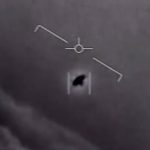Are Extraterrestrials and Extra-fast Travels Alien To Christianity?
As I’ve planned, my hope this week is not so much to write a giant essay or series of essays, as I’ve done during the past year. Instead, I’d like to start conversations with a question — and gradually let my own views on the topic be revealed, and perhaps developed, in the comments.
So my question for this week is this:
Are extraterrestrials and extra-fast travels alien to Christianity?
This has been a hot topic in Christendom for years, and it especially related to how Christians approach science fiction, whether enjoying futuristic stories, or creating them.
Most of the Christian sci-fi stories I’ve seen either focus on Earth only. Or they’re set in Star Wars-like parallel universes in which Earth and Earthlings are nowhere to be found and God and Christianity exist in symbolic form — such as in Kathy Tyers’ Firebird trilogy.
Some end-times thrillers acknowledge alien activities, only to have it be revealed (shockingly!) that these things are actually demonic in origin (a plausible view that I share, but I don’t think it’s that shocking a conclusion anymore).
Only one Christian-published book I’ve read so far — John Olson’s and Randall Ingermanson’s The Fifth Man — includes the finding of extra-terrestrial life, though in keeping with both less controversial theology and more realistic science, the discovery is that of microbes, not some kind of humanoid civilization.
(By the way, I had thought to address this topic even before the London Sun said today that NASA scientists would unveil the news of evidence for living Martian microbes. …)
Answers: Yes, no …
I think we actually have three potential answers to the question about whether extraterrestrial life exists.
The first would be yes. Along with creating Earth and all its lifeforms in six days as described in Genesis 1-2, God could have also placed different civilizations on other planets. They could be humanoid, they could be more creature-like, they could be something we can’t even imagine based on our own experience with the way life operates. Of course, we can’t know for sure.
That phrase, though, almost immediately follows after speculation that God may have created extraterrestrial life: of course, we can’t know for sure. I haven’t run into any Christians yet who claim that someday we’ll be able to meet these aliens. Instead, Christians who speculate about this are wise enough to realize that the Bible is at best silent on the question. There’s plenty we can know for sure from Scripture, but God hasn’t directly revealed the truth on that issue.
Thus, any speculation outside of Scripture needs to be clearly disclaimed for what it is. But I would argue that even Christians speculating — even in fiction — must conform to God’s Word.
The second answer would of course be no, God didn’t create alien life. I’m sure we’ve heard that response before, especially by those Christians who aren’t too fond of science fiction or a lot of speculation about space travel and science. However, even more-imaginative Christians find indirect, though clear, Biblical basis for disbelieving the existence of aliens.
Gary Bates, author of Alien Intrusion, runs down the reasons with a quick logical overview (I blogged a longer excerpt here). Scripture is clear that if aliens were to exist, God must have created them, Bates writes. But the original creation was both a) centered on God’s creation of man in His image on day 6, and b) corrupted by the sin of Adam and Eve sometime afterward. Thus, the whole universe was affected by the resulting disease and death. However, the Bible tells us repeatedly that Christ died for the sins of human beings. The entire Biblical narrative of sin and redemption has humans as its focus. No mention is made of something literally “out there” such as the inevitable question: how would some form of sentient alien race be redeemed from sin?
Bates concludes his argument:
[Christ] died once. That’s it. Moreover, in the new creation, ruled by Christ, redeemed humanity is going to live as Christ’s “bride” throughout eternity (Eph. 5:22-33; Rev. 19:7-9). Not only is it clear that even the new creation will be designed for mankind, but the idea of Christ separately visiting the planet Vulcan to redeem aliens living there falls down here, too. Because marriage is defined as monogamous—one man for one woman, and the marriage of Christ and His church, born from the spear wound in His side, is a clear parallel to the first man and his bride, born from a wound in the side of Adam. In other words, Christ will not be a bigamist or polygamist. He will have one bride in eternity, not two (an earthly and a Vulcanian one).
Thus, both Scripture and Biblically based logic rule out the existence of extraterrestrial life.
One derivative from this view explains all the UFO sightings and religious fervor over the ideas of aliens, abductions and such — saying that Satanic trickery is at the root of most of it. From what I’ve read in both the Bible and Biblically based material, I agree: plenty of Scripture verses speak clearly about demons still being active in today’s world, deceiving those who reject Christ. Many Christians who’ve been delivered from these false teachings have testified that their New Age practices were interconnected with “UFO” occultic beliefs. Alien Intrusion does a great job of documenting the ways those deceptions work together.
Answers: … Or maybe someday
Bates in his book not only addresses the alien question, but other science-fiction concepts such as interstellar travel, or speculative propulsions such as warp drive or hyperspace jumps.
Ever the realist — though it seems Bates enjoys science fiction with the best of the fanboys — the author brings up some dark matters that faster-than-light travel agents would just prefer avoid. That includes the incredible distances between star systems, the unfathomable amount of energy needed to travel even half light speed, space particles that would rip a space vessel to shreds, and the Biblical and logical oppositions to evolution (which is assumed by many to be the way aliens would have come about, without a Creator).
I would like to say, though, that I think while aliens and fantastic space technologies would be impossible now — why wouldn’t they be possible in the New Heavens and New Earth?
Author Randy Alcorn thinks it could be possible, yet he’s wise enough to realize this is all speculation. I don’t have his book Heaven in front of me, yet toward the last of that volume, Alcorn writes chapters about the New Earth’s characteristics and what redeemed residents will be doing there throughout eternity.
Biblical reasoning for fantastic science and technology is easier to come by than aliens being created. But Alcorn rightly observes this: nothing about the idea of God creating new creatures, whether on Earth or outside it, would detract from His glory.
So have hope, space cadets! Even if we don’t have Klingons, Vulcans, Green Martians, Wookies, Slitheen or Judoon (from Doctor Who) in this universe, why couldn’t they exist in the redeemed universe? Even better, with aliens existing in the New Universe, we won’t face threats from invasion, or the unnecessary involvement of anti-Christian beliefs or storylines.
From Scripture, though, we know that God never does anything except that which will bring Him the most glory, and humans are the highlight of His creation and redemptive story. We can be sure nothing He’ll do on the New Earth will contradict those goals, or detract from our enjoyment of His redeemed creation. In this creation, though, I think His people have plenty of freedom for some sanctified speculation — or parallel-universe stories set in fantastic other worlds, where He and humans may not be present directly, but are definitely represented.
What do you think?









































Bates really makes a lot of assumptions here. The metaphor of Christ being the bridegroom and the universal Church being the bride means sentient alien life cannot exist?
Honestly, it doesn’t follow. Neither does it follow that because the Bible is referring to believers who are human (as all sentient life on earth is) that anyone who doesn’t match our man-made definition of human (ie, our specific 23 pairs of chromosomes) doesn’t match God’s definition.
Honestly, it just doesn’t follow. Bates’ argument, or at least the excerpt you presented here, seems based on a lot of unfounded assumptions.